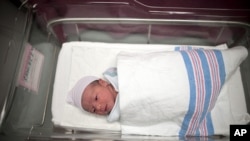More than one million premature babies die each year. Yet experts say 75 percent of these tiny babies could live if they and their mothers received the right kind of care. The new report is not meant to be just a list of facts, but the start of a global health movement.
Henry, a beautiful baby, was in his mother's womb for just 26 weeks - far short of the normal gestation period of 40 weeks. Henry came into the world weighing just under 1,000 grams, at a hospital prepared to care for him. Yet parents Sara and Paul Raak describe the experience as "scary."
Sara acknowledges that, without the help Henry received, the outcome could have been very different.
"He would not have survived. There's not a doubt. He would not have survived. There are too many things that weren't developed when he was born, especially his lungs," she says.
Before birth, Henry got steroids to help his lungs develop. After birth, a ventilator helped him breathe.
Henry is one of 15 million premature babies born in 2010, according to a new report called "Born Too Soon."
Experts from U.N. agencies, universities and organizations like the March of Dimes and Save the Children contributed to the report, which sets out exactly what is known about pre-term birth, its causes, and the kinds of care these babies need.
"The news out of this report is that this is the first time that we know how many babies around the world are born pre-term," explains Dr. Joy Lawn, one of the co-authors.
The report also shows that pre-term birth accounts for almost half of newborn deaths worldwide. And it documents a huge survival gap between rich countries and poor ones, says Christopher Howson, another co-author.
"If you look at babies born at less than 28 weeks in sub-Saharan Africa for example, their chances of dying within the first few days of life are 90 percent," explains March of Dimes' Howson. "The chance of surviving for the same baby being born in a rich country is 90 percent."
Many of these infants could survive with inexpensive techniques. One of the most effective practices is something called "kangaroo care," where the infant is strapped to the mother's chest. The baby stays warm and tends to nurse more often.
"Born Too Soon" shows that the number of pre-term babies is rising - no one knows why - but the report's goal is to spur governments and researchers to find ways to reduce that number and to provide those who are born too soon with all the possibilities that Henry Raak has to live a normal and healthy life.
Henry, a beautiful baby, was in his mother's womb for just 26 weeks - far short of the normal gestation period of 40 weeks. Henry came into the world weighing just under 1,000 grams, at a hospital prepared to care for him. Yet parents Sara and Paul Raak describe the experience as "scary."
Sara acknowledges that, without the help Henry received, the outcome could have been very different.
"He would not have survived. There's not a doubt. He would not have survived. There are too many things that weren't developed when he was born, especially his lungs," she says.
Before birth, Henry got steroids to help his lungs develop. After birth, a ventilator helped him breathe.
Henry is one of 15 million premature babies born in 2010, according to a new report called "Born Too Soon."
Experts from U.N. agencies, universities and organizations like the March of Dimes and Save the Children contributed to the report, which sets out exactly what is known about pre-term birth, its causes, and the kinds of care these babies need.
"The news out of this report is that this is the first time that we know how many babies around the world are born pre-term," explains Dr. Joy Lawn, one of the co-authors.
The report also shows that pre-term birth accounts for almost half of newborn deaths worldwide. And it documents a huge survival gap between rich countries and poor ones, says Christopher Howson, another co-author.
"If you look at babies born at less than 28 weeks in sub-Saharan Africa for example, their chances of dying within the first few days of life are 90 percent," explains March of Dimes' Howson. "The chance of surviving for the same baby being born in a rich country is 90 percent."
Many of these infants could survive with inexpensive techniques. One of the most effective practices is something called "kangaroo care," where the infant is strapped to the mother's chest. The baby stays warm and tends to nurse more often.
"Born Too Soon" shows that the number of pre-term babies is rising - no one knows why - but the report's goal is to spur governments and researchers to find ways to reduce that number and to provide those who are born too soon with all the possibilities that Henry Raak has to live a normal and healthy life.




